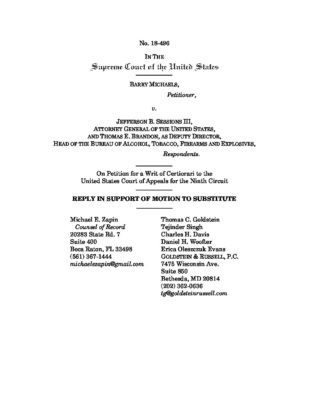US personal tax returns are normally due on April 15; because the 15th fell on a Saturday this year, the IRS extended the date to April 18. That date got a lot of publicity. What got almost no publicity, however, is that Congress changed the date for filing the much more rare Reports of Foreign Bank and Financial Accounts (FBAR). The due date for the FBAR got moved from its usual date of June 30 to April 15 (or, this year, April 18).
Congress could not have been clearer in Section 2006(b)(11) of the Surface Transportation and Veterans Health Care Choice Improvement Act of 2015, Public Law 114-41,
The due date of FinCEN Report 114 (relating to Report of Foreign Bank and Financial Accounts) shall be April 15 [[Page 129 STAT. 459]] with a maximum extension for a 6-month period ending on October 15 and with provision for an extension under rules similar to the rules in Treas. Reg. section 1.6081-5. For any taxpayer required to file such Form for the first time, any penalty for failure to timely request for, or file, an extension, may be waived by the Secretary.
Whether there is some deeper purpose beyond tidiness at work here I leave to the tax lawyers. But if like me you have a foreign bank account (leftover in my case from a period working abroad) and have a tendency to file tax returns rather close to the deadline, you could easily miss the new earlier due date for reporting the foreign account’s existence. Never fear–Treasury has your back: even if this is not the first time you have been required to file an FBAR Treasury has unilaterally given you an automatic extension.
According to the Fincen web site,
The new annual due date for filing Reports of Foreign Bank and Financial Accounts (FBAR) for foreign financial accounts is April 15. This date change was mandated by the Surface Transportation and Veterans Health Care Choice Improvement Act of 2015, Public Law 114-41 (the Act). Specifically, section 2006(b)(11) of the Act changes the FBAR due date to April 15 to coincide with the Federal income tax filing season. The Act also mandates a maximum six-month extension of the filing deadline. To implement the statute with minimal burden to the public and FinCEN, FinCEN will grant filers failing to meet the FBAR annual due date of April 15 an automatic extension to October 15 each year. Accordingly, specific requests for this extension are not required. (Please note: The due date for FBAR filings for foreign financial accounts maintained during calendar year 2016 is April 18, 2017, consistent with the Federal income tax due date.)
Although undoubtedly well-intentioned and useful (the agency likely has better things to do than to put many people unaware of the deadline change into violation and expend resources punishing them in some way) this is nonetheless a rather weird rule given the statute.
Agency regulatory power exists to the extent created by statute (or, perhaps and exceptionally, when deriving directly from inherent Presidential power). It follows, quite obviously, that agencies cannot act in opposition to a statute, for that would be not only arbitrary and capricious but ultra vires as well. Nor, we learned from Youngstown Sheet & Tube v. Sawyer (The Steel Seizure Case), 343 U.S. 579 (1952), can the President act in the teeth of a clear statutory command, save perhaps when applying an equally clear Constitutionally delegated power.
Some people argue that President Obama violated this basic principle when ordering ICE to deprioritize enforcement against certain classes of undocumented persons. But that was, in form and I would argue in substance as well, not a case of totally undermining the statute, but rather a Presidential decision to choose among priorities in a world in which it was clear resources were inadequate to fully enforce all the rules Congress had asked ICE to enforce. What is more, in form although perhaps not in substance, the Obama regulation did not require agents to refrain from deporting the favored classes of non-dangerous aliens; it merely suggested rather strongly that this would be a good idea.
Given this context, Treasury’s FBAR extension rule seems a little weird. There can be little doubt that the automatic deadline extension effectively not only undermines the statutory command that there be an earlier due date but in practice extends the former June 30 deadline to October 15. It does so by paying lip service to the deadline–it is officially April 15 (or 18)–but gives everyone effected an automatic extension whether or not they ask for one.
I think this may be too cute. But I also think it is unchallengable, since no one has standing to complain: the people affected by the rule are not harmed in any way, and nothing stops them from filing by the 18th if they want to. And no one else has a legal interest. Perhaps Congress could sue, as the House did over the Obama regulations, but the issue is far too trivial to merit that response.
It’s not unusual to see an agency rule that seems to go farther than a statute allows; such is the bread and butter of administrative-law-based challenges to regulations. It’s a lot stranger to see an administrative pronouncement that not only undermines a statutory command but in fact does the opposite.
 Post-Mueller, the Trump Family 1 has embarked on a novel litigation strategy: bringing really bad claims. Making terrible legal arguments is nothing new for the Trumps, but generally they’ve made those arguments as defendants, often while defending very amateurish and inept attempts to overturn Obama-era regulations. And almost universally, those lost.
Post-Mueller, the Trump Family 1 has embarked on a novel litigation strategy: bringing really bad claims. Making terrible legal arguments is nothing new for the Trumps, but generally they’ve made those arguments as defendants, often while defending very amateurish and inept attempts to overturn Obama-era regulations. And almost universally, those lost.
